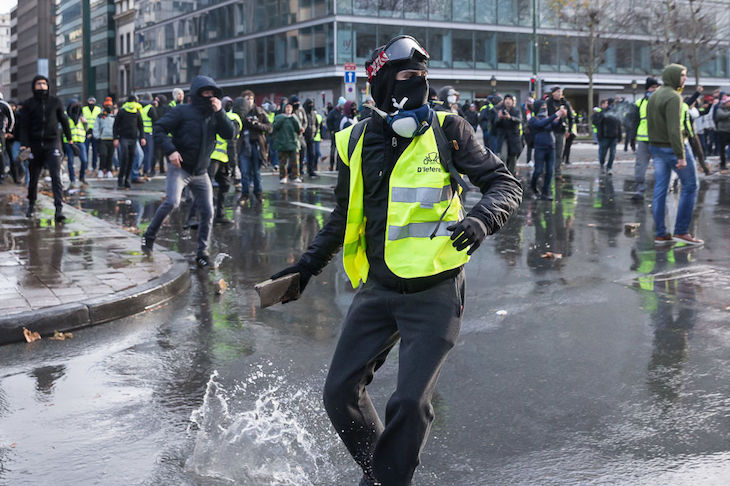There are conspiracy theories doing the rounds in France among some gilets jaunes that Tuesday’s Islamist attack in Strasbourg was somehow fabricated by the government. It was cooked up, so the social media conspirators say, to deter demonstrators from launching a fifth weekend of protests.
The various theories are all very far-fetched. The alleged gunman, Chérif Chekatt, who was shot dead by police on Thursday evening, had a history of violent crime and, more significantly, is believed to have been converted to Islamic extremism while in prison. It’s a back story shared by several other Islamists who have carried out attacks in France in the last six and a half years.
Nonetheless, there may well be a connection between the Strasbourg attack and the yellow vest movement. In an interview in Thursday’s Le Figaro, Gilles Kepel, France’s leading expert on Islamic extremism, said the protests have provoked much comment on French Jihadist internet forums. ‘It seems that these events have given them a form of courage after the despondency they’ve experienced since the fall of Raqqa,’ explained Kepel. ‘For them, it’s the sign that French society has profound weaknesses and flaws into which it may be possible to insinuate themselves.’ Islamic State has claimed Chekatt was one of their ‘soldiers’ and, whether that was true or not, Kepel believes French Islamists see the social tension caused by the gilet jaune movement as an ‘opportunity’ to sew further chaos.
What Kepel described in a 2016 book as the ‘fracture’ of French society has always been the objective of the Islamists. As far back as 2005 the Syrian intellectual Abu Musab al-Suri, published his 1600-page manifesto, The Global Islamic Resistance Call, urging a decentralised Jihad against Europe, and in particular France, with its large Muslim population.
Al-Suri, who emigrated to France in the 1980s, knew the country well and believed the long history of animosity between left and right was another reason why France was so vulnerable to attacks from Islamic extremists.
That was before the Socialist Party imploded under the weight of its political correctness and now only well-heeled metropolitans vote for the centre-left. An increasing number of working-class Socialists cast their ballot for Marine Le Pen, in the same way former Communists turned to her father’s National Front in the 1970s after the collapse of their party.
The strength of the gilet jaune movement to date has been its diversity, its ability to cut across class and political boundaries. But the lengthy list of concessions announced by Emmanuel Macron may have diminished that diversity. The moderates, among whom are many middle-class gilets jaunes, have called for a truce to allow the president time to fulfil his pledges. Laurent Wauquiez, leader of the centre-right Républicains, believes the protests should stop.
Other gilets jaunes, described by the French media as ‘radicals’, declare that now is not the time to back off. Their ultimate aim is to force Macron from office and the struggle will continue until that objective is achieved. ‘Act V’ of what the far-left’s Jean-Luc Mélenchon calls the ‘Citizens’ Revolution’ will go ahead this weekend.
Marine Le Pen hasn’t been as bellicose as Mélenchon in calling for a continuation of the protests because she is attempting a delicate balancing act; on the one hand keeping herself allied to the movement while trying not to antagonise the police, many of whom vote for her. She was quick to tweet her gratitude to the security forces for shooting dead Chekatt, just as she wasted no time in condeming the government for their failure to prevent Tuesday’s carnage because of what she claims is a lax counter-terrorism strategy.
Her rhetoric against Islamists and immigration has increased in recent months, and it appears to have done her standing no harm. An opinion poll this week says the National Rally is on course to come first in May’s European elections with 24 per cent of the vote, six per cent more than Macron’s LaREM party. This would replicate her success in the 2014 elections when her party topped the poll with 25 per cent of the vote.
Le Pen does well in the Europeans because it is one round of voting; her problem is with the two round system in the French regional and presidential elections, when opponents gang up in the second round to block her party from winning seats.
If she’s ever to win power in France she needs to form a strong alliance, and perhaps the gilet jaune movement has given her a prospective partner. On the surface she has little in common with Mélenchon but the two share a deep-seated eurosceptism and a belief in economic protectionism. There is also an increasing convergence on immigration with Mélenchon described as developing ‘a less open and generous vision’. This may be out of necessity with opinion polls regularly showing that the majority of his supporters are opposed to mass immigration.
Could the pair ever form an ‘odd couple’ alliance, similar to the coalition in Italy between the Northern League and Five Star Movement? Don’t rule it out. There is an entertaining clip on youtube from a few years back of Le Pen and Mélenchon having a friendly natter after a chance encounter; and the leader of France Insoumise was condemned by the liberal elite last year for refusing to endorse Macron in the presidential election run-off against Le Pen.
If the idea of an alliance between Le Pen and Mélenchon sounds a little far-fetched remember that we are in extraordinary times. If someone had said at the start of November that within weeks Emmanuel Macron would be brought to his knees by a motley crew wearing yellow vests, they would have been carted off by the men in white coats.







Comments